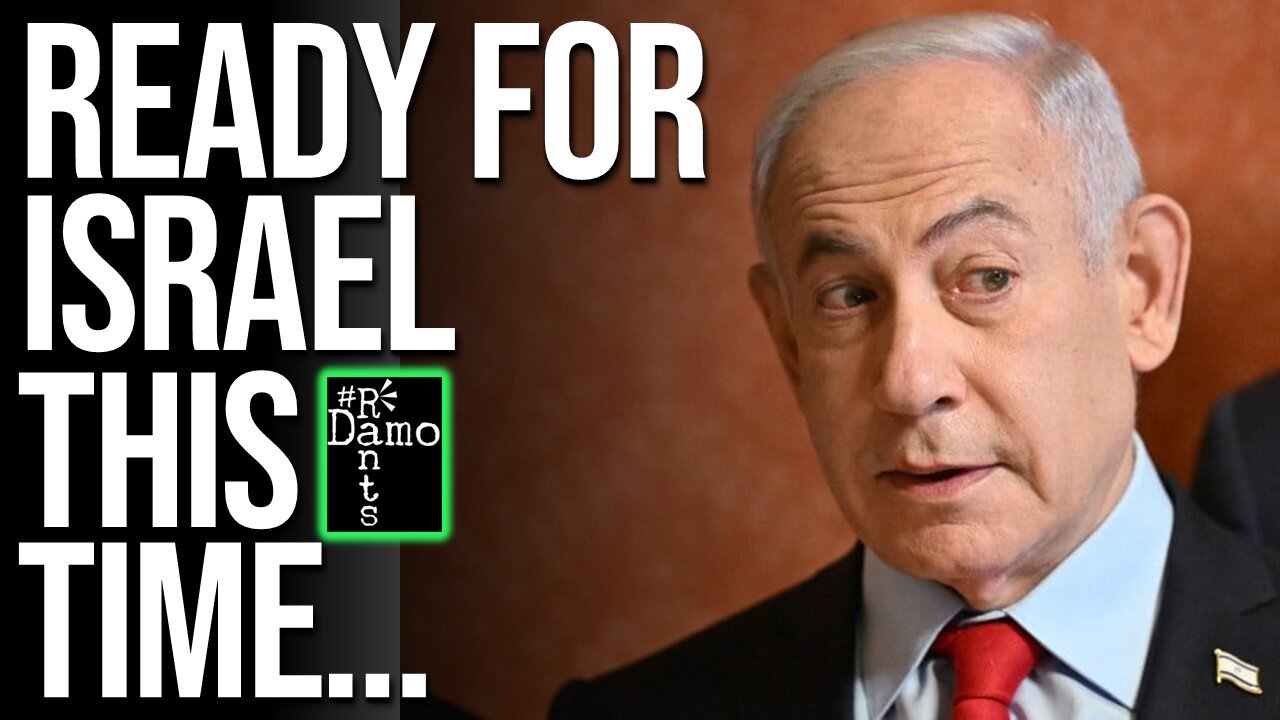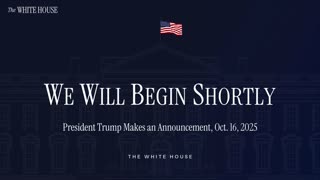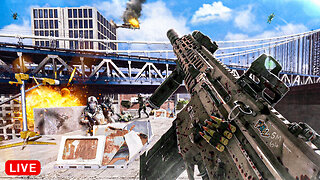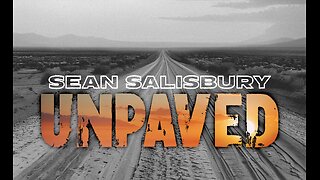Premium Only Content

From Gaza to The Hague - Why Israel’s Lawyers Are Panicking
Right, so this morning, the Handala slipped from its moorings from the Sicilian port of Syracuse and set a course for Gaza, the latest mission by the Freedom Flotilla Coalition having now launched. Its deck was lined not with weapons as they have previously been accused of of course, but with food, medicine, and human rights activists—journalists, doctors, lawmakers, labour organisers. Named after the barefoot cartoon child drawn by Palestinian artist Naji al-Ali, Handala has long symbolised the steadfastness of the Palestinian people and their right to return. And that is no accident because this voyage, like its namesake, is defiant, deliberate, and deeply political.
More than a delivery of aid, the Handala is also a floating rebuke. It challenges not only Israel’s 18-year-long naval blockade of Gaza but also the silence and complicity of an international community that has failed to protect Palestinian civilians or enforce its own legal frameworks. Coming just weeks after the high-profile interception of the Madleen—which carried among others Greta Thunberg and Rima Hassan—the Handala represents not only continuity, but escalation: a renewed confrontation between civil society and state violence on the open seas.
As governments hide behind platitudes and the UN’s outrage dissipates into procedural nothingness and much tutting and hand wringing, ordinary people are acting where institutions are failing. So lets look at the significance of the Handala’s voyage, the fallout from the Madleen seizure that has led up to ir, and what this flotilla movement reveals about the current moral, legal, and political order, because this is about a lot mor than merely the right of a boat to sail—but the right of a people to live free from siege.
Right, so Israel’s blockade of Gaza began back in 2007 following the electoral victory of Hamas the year before, but if course things go back far longer than that—in decades of occupation, siege, and settler-colonial containment. Israel claims the blockade is a matter of national security, that old chestnut again. Yet for Palestinians in Gaza, it has meant imprisonment without trial for 2.2 million people, with profound consequences for health, mobility, and livelihoods. 10% of that population now unaccounted for after 21 months of genocide.
The blockade has operated through a system of severe restrictions. Israel limits goods entering Gaza by classifying a wide range of essential items as "dual-use," claiming they could have military applications. This includes construction materials like cement and steel, as well as certain medical devices. Militant stethoscopes and not liking the way Palestinian builders hold their trowels, it might be a bit antisemitic. In all seriousness though, the result is a man-made economic collapse. Hospitals lack the most basic supplies. Educational institutions suffer from shortages of books and equipment. Electricity is rationed in most areas, with frequent blackouts disrupting daily life and critical medical services.
According to the UN and human rights bodies including Amnesty International, the blockade constitutes a form of collective punishment, therefore violating the Fourth Geneva Convention. Restrictions on fuel, electricity, food, and even fishing waters have strangled the economy and made daily life unliveable. Gaza’s healthcare system has collapsed. Access to water is critically low. Children grow up in trauma if they grow up at all, and their malnutrition is chronic. Fishing, once a vital economic activity, is now a life-threatening endeavour, as Israeli patrol boats frequently fire on or arrest fishermen who stray beyond arbitrarily imposed limits.
In the words of Amnesty International, the blockade is part of a larger "apartheid system" that subjects Palestinians to domination and dispossession. The sea, once a source of livelihood and freedom, has become a military perimeter. Aid vessels are treated as threats. And yet, it is through the sea that resistance has once again emerged.
On June 9, the Madleen, that previous Freedom Flotilla vessel, was intercepted in international waters by Israeli naval forces. The boat was unarmed and filled with medical and food supplies. Among its 25 passengers were high-profile figures including Greta Thunberg and Rima Hassan, whose detention garnered immediate global attention and condemnation.
The Israeli government responded with a campaign of disinformation, branding the activists "terror sympathisers" and forcing detainees to watch video footage of the October 7 Hamas attacks during interrogation. This tactic, has been described as psychological cruelty, was widely condemned by observers as an act of state intimidation meant to delegitimise and emotionally destabilise peaceful activists. Israel's use of coercion and narrative manipulation in such detentions was likened to psychological warfare.
Countries like Spain, Ireland, Sweden and Turkey protested the seizure. Turkey’s foreign ministry labelled the action "a clear act of piracy." Spain summoned Israel’s ambassador. Legal experts questioned the interception’s legality under the UN Convention on the Law of the Sea (UNCLOS), which prohibits the interference with civilian vessels in international waters without lawful justification. The seizure of the Madleen reinvigorated legal discussions on the application of international maritime law in blockaded zones, sparking debates about state accountability.
The Madleen’s interception did not intimidate the movement though—it invigorated it. It revealed the desperation of a state losing control over its narrative and exposed the brutality required to maintain its siege. It also demonstrated the power of visibility: livestreams, social media posts, and international headlines, there’s no denying the prominence of those on board playing a part too, pierced the traditional media fog that often shrouds Gaza.
The Handala, launched today from Syracuse, is the latest—and potentially most politically explosive—flotilla vessel to challenge the blockade. Its passengers include Christian Smalls, a US labour organizser known for unionising Amazon warehouses. Emma Fourreau, a Member of the European Parliament from France, much like Rima Hassan before her and Gabrielle Cathala, a French National Assembly deputy and longtime Palestine advocate, are also aboard. Joining them is a rotating international crew of medics, journalists, lawyers, and civil society figures from Norway, Italy, Malaysia, and Australia.
Its cargo is both symbolic and practical: emergency medicine, water filters, and food staples, representing not just charity but solidarity. Its aim, as articulated by the Freedom Flotilla Coalition, is not merely to “deliver aid”—but to “break the siege.”
More importantly, the Handala is prepared. Organisers have anticipated potential Israeli interception and equipped the boat with satellite communications and livestreaming capabilities. A legal support team has been briefed. Consular officials in several countries have been notified and activated.
The Handala’s crew know what may await them. Israeli forces have a long track record of using disproportionate force against flotilla vessels. The 2010 Mavi Marmara raid, in which 10 activists were killed by Israeli commandos in international waters, casts a long shadow.
More recently, the Madleen’s boarding included masked soldiers, armed confrontation, and illegal seizure of phones and documents. The Freedom Flotilla Coalition has accused Israel of systematic psychological warfare, including coercive interrogation tactics and media distortion.
The Handala anticipates the same. But this time, it is better prepared. Journalists onboard are trained to document everything. Live video feeds can be uploaded in real-time. All crew have undergone nonviolence training. Legal teams are standing by to launch war crimes complaints in multiple jurisdictions.
This is not an impulsive stunt. It is a well-calculated act of civil resistance, constructed to withstand propaganda, legal intimidation, and violent disruption.
Governments across Europe and the Global South are watching closely. Following the Madleen incident, Spanish passengers filed a war crimes complaint in Madrid. French and Irish lawmakers issued public condemnations. The EU was forced to comment, albeit meekly.
The Handala's voyage will no doubt escalate these tensions. If Israel intercepts another civilian vessel in international waters—especially one carrying elected officials again—the legal and diplomatic backlash needs to be severe. Already, activists and legal experts are preparing new universal jurisdiction cases in Belgium, Norway, and South Africa.
The Israeli state may again resort to media distortion. But after the Madleen, the mask is slipping. The footage of masked commandos seizing medics and detaining climate activists has damaged Israel’s image more than ever before.
The Handala is therefore more than just an aid ship—it is a test case for the global order. Legally, it challenges the validity of Israel’s blockade under international law. UNCLOS prohibits interference with peaceful vessels outside territorial waters unless there is evidence of piracy, slave trading, or unauthorised broadcasting. None apply here. Politically, it forces Western governments to choose: will they defend their citizens’ rights to peaceful protest and humanitarian action, or will they remain silent out of deference to Israel? Philosophically, the flotilla questions what it means to act morally in a system rigged to reward impunity.
The Handala sails in the tradition of other global solidarity movements: the International Brigades in Spain, the anti-apartheid sanctions campaigns, and the boats that broke the US blockade of Cuba in the 1960s. But it is uniquely of this moment.
It is decentralised, multinational, and digitally connected. It carries not only aid but testimony, resistance, and evidence. It reflects a growing recognition that international law will not be enforced from above—but must be claimed from below.
In an era of impunity—from Gaza to Sudan to Myanmar—the Handala offers a blueprint for transnational civil resistance. It says: if governments won’t act, people will.
So what could happen this time with this voyage then Damo? Well, several scenarios could unfold. Israel may again seize the ship, this seems quite likely. But the presence of elected officials and better media coverage could produce a deeper diplomatic crisis. Legal cases may multiply. Public protests could escalate. The blockade may become politically untenable. That would be nice wouldn’t it? Maybe a bit hopeful. Alternatively, Israel might surprise observers by allowing the Handala to dock in Gaza. Yeah right. The most dangerous possibility is that Israel could escalate violence, leading to casualties. If such violence occurs and is captured on camera, the footage could ignite global outrage. International condemnation may reach a critical mass, forcing the ICC to open an emergency investigation.
Regardless of the outcome, the Handala’s voyage marks a turning point. It reasserts the sea as a space of political contestation and moral clarity.
The Handala is not a military threat. It carries no arms. It poses no danger. What it does carry is far more powerful than that: a challenge to impunity, a refusal to forget Gaza, and a demand for justice from a world that has grown used to abandoning the Palestinians.
As it sails toward a blockade upheld by drones, warships, and silence, the Handala reminds us that the law means nothing if it not enforced and these ordinary people strive to do just that, the lack of governmental help in that endeavour as sharply in focus as their mission is.
For more on how the seizure of the Madleen backfired badly on Israel, please do check out this video recommendation here as your suggested next watch.
Please do also hit like, share and subscribe if you haven’t done so already so as to ensure you don’t miss out on all new daily content as well as spreading the word and helping to support the channel at the same time which is very much appreciated, holding power to account for ordinary working class people and I will hopefully catch you on the next vid. Cheers folks.
-
 LIVE
LIVE
The White House
1 hour agoPresident Trump Makes an Announcement, Oct. 16, 2025
1,068 watching -
 LIVE
LIVE
Right Side Broadcasting Network
5 hours agoLIVE: President Trump Makes an Announcement - 10/16/25
5,800 watching -
 LIVE
LIVE
StoneMountain64
2 hours agoBattlefield 6 is just TOO FUN
196 watching -
 14:51
14:51
Dr. Nick Zyrowski
3 days agoWho Should Follow A Low Carb Diet? (Surprising Answer!)
8472 -
 1:16:41
1:16:41
Steven Crowder
6 hours agoFacts Based "Racism" | Black & White on the Gray Issues Pt. 2
326K1.09K -
 1:02:50
1:02:50
DeVory Darkins
3 hours ago $20.85 earnedDemocrats HUMILIATED during painful town hall as Federal Judge drops desperate ruling
89.6K73 -
 1:16:49
1:16:49
Sean Unpaved
4 hours agoNFL Chaos, Jays' Homer Frenzy, & CFB/CBB Blue Bloods Overview
26.1K1 -
 1:02:23
1:02:23
Mark Kaye
3 hours ago🔴 MELTDOWN- Pelosi and AOC RAGE On Live TV!
20.8K7 -
 39:50
39:50
ArynneWexler
2 hours agoMarjorie's Meltdown and Mini Somalia in Minneapolis
11.9K10 -
 1:02:13
1:02:13
Timcast
3 hours agoTrump NUKING H1B, Overhauls Immigration, Democrats LOSE IT
134K55